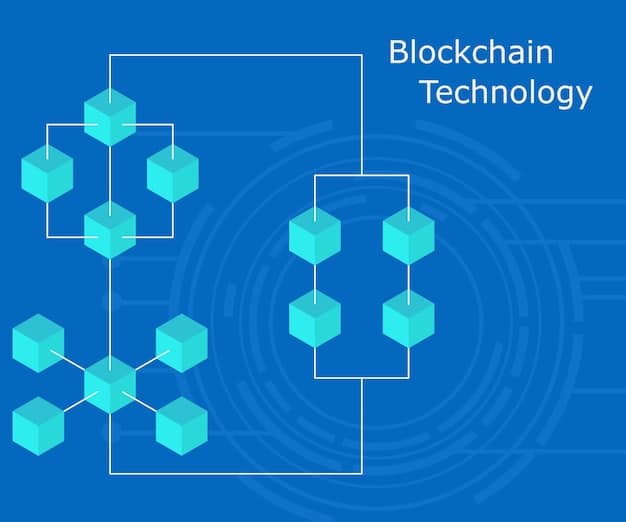Blockchain in Automotive: Transforming the Industry?

Exploring the potential of blockchain technology in the automotive industry reveals a transformative force, enhancing security, transparency, and efficiency across various applications from supply chain management to vehicle lifecycle tracking.
The automotive industry is on the cusp of a technological revolution, and one of the most promising innovations is blockchain. Exploring the potential of blockchain technology in the automotive industry reveals opportunities that extend far beyond simple transactions, impacting everything from supply chain management to data security and the very ownership experience of vehicles.
Understanding Blockchain Technology in Automotive
Blockchain, originally known for its role in cryptocurrencies, is now making waves across various industries. In the automotive sector, its potential applications are vast and varied, offering solutions to some of the industry’s most pressing challenges. But what exactly does blockchain offer, and why is it relevant to the future of cars?
The core of blockchain lies in its ability to create a secure, transparent, and immutable record of transactions. This decentralized ledger system ensures that data is tamper-proof and can be accessed by authorized parties only. This characteristic is particularly useful in industries that require a high degree of trust and security.

Key Benefits of Blockchain in Automotive
Blockchain brings several key advantages to the automotive industry, enhancing efficiency, security, and transparency in a number of critical areas:
- Enhanced Security: Blockchain’s decentralized nature makes it incredibly difficult for hackers to alter or manipulate data, ensuring a secure environment for sensitive information.
- Improved Transparency: All transactions are recorded on a public ledger, providing a transparent record of ownership, maintenance, and other critical data points.
- Increased Efficiency: By streamlining processes such as supply chain management and payment systems, blockchain can reduce costs and improve efficiency across the board.
- Greater Trust: The immutable nature of blockchain fosters trust among all stakeholders, from manufacturers to consumers, ensuring that everyone has access to the same verified information.
Ultimately, this technology could streamline operations, enhance security, and revolutionize interactions within the industry. As blockchain continues to mature, its applications in automotive are poised to expand, bringing about a new era of trust and transparency.
Supply Chain Management with Blockchain
One of the most promising applications of blockchain in the automotive industry is in supply chain management. The automotive supply chain is incredibly complex, involving numerous suppliers, manufacturers, and distributors spread across the globe. This complexity can lead to inefficiencies, delays, and even fraud. Blockchain offers a solution by providing a transparent and secure record of every step in the supply chain.
By tracking parts and components from their origin to the assembly line, blockchain can verify the authenticity and quality of these items. This helps to prevent counterfeit parts from entering the supply chain, ensuring that consumers receive safe and reliable vehicles.
Tracking and Traceability
Blockchain enables real-time tracking and traceability of automotive parts, providing complete visibility over the entire supply chain. This is crucial for identifying bottlenecks, preventing delays, and ensuring that materials are delivered on time.
Imagine a scenario where a specific batch of tires is found to be defective. With blockchain, manufacturers can quickly identify all vehicles that were fitted with those tires, allowing for a targeted recall. This level of precision is simply not possible with traditional supply chain management systems.
- Real-Time Tracking: Monitor the movement of parts and materials in real-time, reducing delays and improving efficiency.
- Counterfeit Prevention: Verify the authenticity of parts and components, preventing counterfeit items from entering the supply chain.
- Quality Assurance: Ensure that all parts meet the required standards, improving the overall quality and reliability of the vehicle.
- Recall Management: Quickly identify and recall vehicles fitted with defective parts, minimizing the impact on consumers.
In conclusion, blockchain has the potential to transform automotive supply chain management, improving efficiency, security, and transparency. By providing a single source of truth for all stakeholders, it enables better collaboration and decision-making, ultimately benefiting both manufacturers and consumers.
Enhancing Vehicle Data Security
As vehicles become increasingly connected, the risk of cyberattacks grows exponentially. Modern cars are essentially computers on wheels, collecting and transmitting vast amounts of data. This data, if compromised, could be used to steal vehicles, access personal information, or even remotely control critical systems. Blockchain offers a robust solution to enhance vehicle data security and protect against these threats.
By encrypting and decentralizing vehicle data, blockchain makes it incredibly difficult for hackers to access or manipulate information. This ensures that critical systems remain secure and that personal data remains private.

Key Aspects of Data Security with Blockchain
Here are some essential ways blockchain technology improves overall data security in modern vehicles:
Imagine a scenario where a hacker attempts to access a vehicle’s onboard computer. With blockchain, any unauthorized attempt to alter data would be immediately detected and rejected, preventing the attack from succeeding.
- Data Encryption: Encrypt sensitive data stored on the vehicle, protecting it from unauthorized access.
- Decentralized Storage: Distribute data across a network of nodes, making it difficult for hackers to target a single point of failure.
- Access Control: Implement strict access controls, ensuring that only authorized parties can access vehicle data.
- Tamper Prevention: Detect and prevent unauthorized attempts to alter vehicle data, protecting against cyberattacks.
In summary, blockchain can significantly enhance vehicle data security, protecting against cyberattacks and ensuring that personal information remains private. By providing a secure and transparent platform for data management, it enables greater trust and confidence among vehicle owners and manufacturers.
Smart Contracts for Automotive Transactions
Smart contracts, self-executing agreements written in code, have the potential to revolutionize automotive transactions. These contracts can automate and streamline a wide range of processes, from vehicle sales to insurance claims, making them more efficient and transparent.
By eliminating the need for intermediaries, smart contracts can reduce costs and improve efficiency across the board. They also provide a secure and tamper-proof record of all transactions, ensuring that all parties involved adhere to the terms of the agreement.
Use Cases for Smart Contracts
Smart contracts present an array of specific use cases that could significantly bolster operational efficiency and consumer confidence in the automotive sector:
Consider a consumer who wishes to purchase a used car. A smart contract could automatically verify the vehicle’s history, ensuring that there are no outstanding liens or hidden damage. Once the buyer and seller agree on the terms, the smart contract could automatically transfer ownership and release payment, making the entire process seamless and secure.
- Vehicle Sales: Automate the transfer of ownership and payment, making the car buying process more efficient and secure.
- Insurance Claims: Streamline the filing and processing of insurance claims, reducing costs and improving customer satisfaction.
- Rental Agreements: Automate the rental process, including payment and vehicle access, making it easier for customers to rent cars.
- Peer-to-Peer Car Sharing: Enable secure and transparent car sharing arrangements, allowing owners to rent out their vehicles to others.
Ultimately, smart contracts have the potential to transform automotive transactions, making them more efficient, transparent, and secure. By automating key processes and eliminating the need for intermediaries, they can reduce costs and improve customer satisfaction across the board.
Blockchain in Autonomous Vehicle Development
The development of autonomous vehicles requires a vast amount of data, including sensor readings, mapping information, and driving behavior. Blockchain can play a critical role in securely managing and sharing this data, accelerating the development of self-driving cars.
By providing a transparent and immutable record of all data, blockchain can ensure that developers have access to high-quality information. This enables them to train their algorithms more effectively and improve the overall performance of autonomous vehicles.
Data Management and Sharing
Efficiently managing and securely sharing immense datasets represents a core challenge in the domain of autonomous vehicle development. Blockchain brings multiple solutions to the table:
Imagine a scenario where multiple companies are working on autonomous vehicle development. Blockchain could provide a secure platform for sharing data, enabling them to collaborate more effectively. This would accelerate the pace of innovation and bring self-driving cars to market sooner.
- Secure Data Storage: Store sensor readings, mapping information, and driving behavior data securely on a decentralized ledger.
- Transparent Data Sharing: Share data with authorized parties in a transparent and auditable manner.
- Data Validation: Ensure the quality and accuracy of the data used to train autonomous vehicle algorithms.
- Incentive Programs: Reward data providers for contributing high-quality data, encouraging greater participation.
In conclusion, blockchain can play a critical role in autonomous vehicle development by securely managing and sharing data. By providing a transparent and immutable record of all information, it enables better collaboration and innovation, ultimately accelerating the arrival of self-driving cars.
Blockchain for Vehicle Lifecycle Tracking
From the moment a vehicle rolls off the assembly line to the day it’s recycled, its lifecycle involves a series of transactions and events. Blockchain can provide a transparent and immutable record of this lifecycle, including ownership, maintenance, and accident history. This information can be valuable for buyers, sellers, and insurance companies, providing greater trust and transparency in the automotive market.
By tracking the complete lifecycle of a vehicle, blockchain can ensure that all parties involved have access to accurate and reliable information. This helps to prevent fraud, improve safety, and promote greater trust in the automotive industry.
Benefits of Comprehensive Lifecycle Tracking
Comprehensive lifecycle tracking of vehicles offers unparalleled benefits that translate into more responsible use and increased value for both consumers and stakeholders:
Consider a used car buyer who wants to verify the vehicle’s maintenance history. With blockchain, they could easily access records, ensuring that the car has been properly maintained and that there are no hidden issues. This would give them greater confidence in their purchase and reduce the risk of unexpected repairs.
- Ownership Tracking: Track the ownership history of a vehicle, preventing fraud and ensuring that buyers have clear title.
- Maintenance Records: Maintain a secure and transparent record of all maintenance and repairs, improving vehicle reliability and resale value.
- Accident History: Track accident history, providing buyers with valuable information about the vehicle’s condition.
- Recycling Information: Track the recycling of vehicle components, promoting sustainability and reducing waste.
In summation, blockchain offers a means to track a vehicle’s entire lifecycle, instilling more confidence and openness in the automotive marketplace. It minimizes fraudulent activities, elevates safety standards, and cultivates greater confidence among all stakeholders in the automotive industry.
| Key Point | Brief Description |
|---|---|
| 🔒 Enhanced Security | Decentralized data makes hacking difficult. |
| 🔄 Supply Chain Management | Tracks parts from origin to assembly line. |
| 📜 Smart Contracts | Automates transactions like sales and insurance. |
| 🚗 Lifecycle Tracking | Records ownership, maintenance, and accidents. |
Frequently Asked Questions
▼
Blockchain is a decentralized, immutable ledger that records transactions across many computers. This makes it secure and transparent, ideal for various applications beyond cryptocurrency.
▼
Blockchain provides transparency and traceability in the supply chain, tracking parts from origin to assembly. This prevents counterfeit parts and ensures quality and timely delivery of materials.
▼
Smart contracts are self-executing agreements that automate various automotive transactions, such as vehicle sales and insurance claims, reducing costs and improving efficiency and security.
▼
Blockchain encrypts and decentralizes vehicle data, making it difficult for hackers to access or manipulate. This protects critical systems and ensures personal data remains private and secure.
▼
Blockchain securely manages and shares the vast amounts of data needed for autonomous vehicle development, ensuring developers have access to high-quality information for effective algorithm training.
Conclusion
Exploring the potential of blockchain technology in the automotive industry reveals a myriad of transformative applications that promise to reshape the sector. From enhancing supply chain transparency and bolstering data security to streamlining transactions and accelerating autonomous vehicle development, blockchain stands as a pivotal innovation poised to drive the future of automotive technology.





